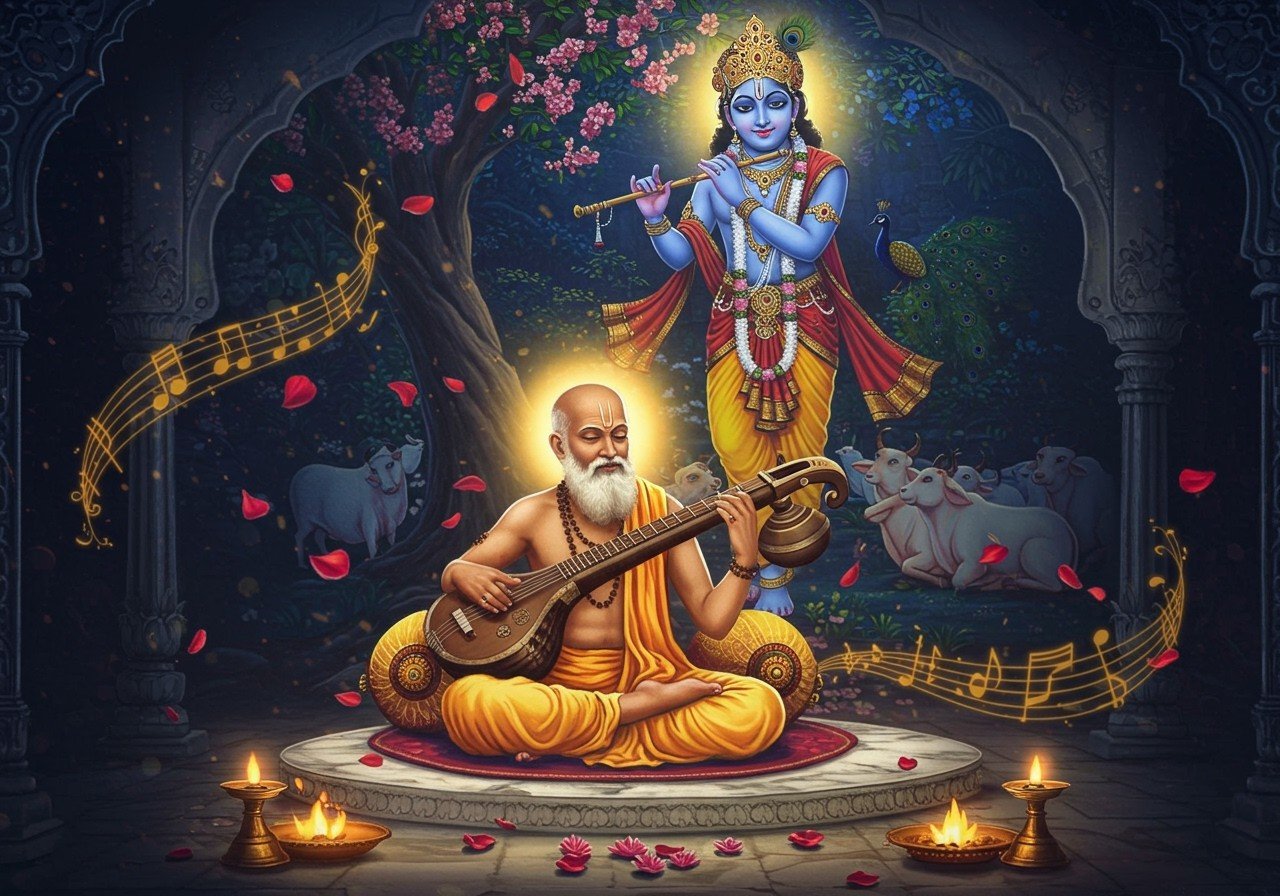
Surdas, a revered 15th-16th-century blind poet and saint, holds a prominent place in Indian devotional literature. Renowned for his soul-stirring songs dedicated to Lord Krishna, he stands as a significant figure in the Bhakti Movement. His works resonate with cultural and spiritual richness, reflecting his unwavering devotion and love for Krishna.
Early Life and Influences
Details about Surdas’s early life are scarce, shrouded in the mists of time. Born in the 15th century, a period of vibrant cultural and religious exchange, he is often depicted as blind, a characteristic sometimes interpreted as symbolic of his profound inner vision. This era witnessed the flourishing of the Bhakti movement, which emphasized personal devotion over ritualistic observances.
Amidst the diverse religious influences of his time, Surdas’s spiritual path was profoundly shaped by Vallabhacharya, a leading figure in the Bhakti movement. Vallabhacharya’s teachings focused Surdas’s devotion on Lord Krishna, a choice reflected in the distinctive voice of his poetry. This spiritual connection set Surdas apart, solidifying his unique contribution to the era’s rich tapestry of religious expression.
Exploring the Poetic World of Surdas
Surdas, a pivotal figure within the Bhakti Movement, is celebrated for his heartfelt devotional songs dedicated to Lord Krishna. His poetry, notably “Sur Sagar,” encapsulates the essence of divine love and devotion. His verses beautifully depict themes of love, innocence, and the yearning for spiritual connection.
Themes and Style
- Love and Devotion (Bhakti): Surdas’s poetry emphasizes that true devotion stems from unwavering love and surrender to the divine will, rather than adherence to rituals or dogma. It transcends outward practices and delves into the heart of spiritual connection. His emphasis on love and surrender resonated with many during the Bhakti movement.
- Divine Love: The divine love between Radha and Krishna is a central theme in Surdas’s work. It serves as a metaphor for the soul’s longing for God. This depiction of divine love is both deeply personal and universally relatable, symbolizing the yearning for union with the Supreme. This theme adds another layer to the rich tapestry of Bhakti poetry.
- Childhood of Krishna (Bal Leela): Surdas’s poems often portray the enchanting childhood of Lord Krishna, showcasing his playful nature. His poems vividly depict the loving relationship between Krishna and his mother, Yashoda. These depictions bring Krishna’s early life to life.
- Separation (Viraha): Surdas poignantly explores the pain of separation, particularly Radha’s longing for Krishna. This theme represents the soul’s separation from God, the ultimate sorrow. Through this exploration of viraha, Surdas evokes the deep emotional and spiritual aspects of longing for the divine.
- Innocence: Surdas’s poetry beautifully captures the innocence of Krishna’s childhood and the pure maternal love of Yashoda. These themes add a layer of tenderness to his devotional works. They resonate with readers on a deeply emotional level, highlighting the beauty of pure love and devotion.
- Language: Surdas primarily used Braj Bhasha, a dialect of Hindi, making his work accessible to a wider audience. His evocative yet simple language allowed his message of devotion to reach the hearts of many. The lyrical beauty and emotional depth of his verses contributed to the widespread popularity of his poetry.
Key Aspects and Major Work
- Devotion to Krishna: Surdas worshipped Krishna as the Supreme God. His poetry centers on Krishna’s childhood and the divine love between Radha and Krishna. It highlights the importance of Bhakti in achieving spiritual liberation.
- Bhakti as Liberation: Rejecting ritualistic worship and caste discrimination, Surdas believed that pure devotion (Bhakti) was the path to God. He emphasized a direct and personal connection with the divine, accessible to all regardless of social standing.
- Simplicity and Surrender: Surdas taught that God loves simple-hearted devotees. His poetry emphasizes the importance of humility and surrender in approaching the divine. He advocated for a path of devotion free from elaborate rituals and external displays of piety.
- Sur Sagar: Surdas’s magnum opus, “Sur Sagar,” is a vast collection of verses. It delves into themes of love, separation, and the profound bond between devotee and the divine. This work remains a cornerstone of Bhakti literature.
Historical Context and Legacy
Surdas lived during a time of significant social and religious change. Through his poetry, he challenged social hierarchies, advocating for direct engagement with the divine. He questioned the authority of the priestly class, promoting a more egalitarian spiritual environment. Following Vallabhacharya, Surdas embraced Pushtimarg, a path of devotion focused on Krishna’s child form. His legacy endures, inspiring devotion and spiritual reflection, reminding us of the power of love and faith to transcend all boundaries.
Poojn.in: Supporting Your Krishna Bhakti
Poojn.in, India’s largest cultural goods and services store, offers a wide selection of authentic puja items to enhance your Krishna bhakti practices, following the tradition of Sant Surdas. Browse our Puja Samagri collection or explore specific categories like Clay Items and Dashakarma Items. You can also discover unique items in our Low-Value Products section or explore various brands through our Brands page. We even offer items like Cycle brand products.
Essential Puja Items: Discover Holy Utensils, Holy Idols, Holy Food, Holy Cosmetics, Holy Jewellery, and Jaribooti to enrich your devotional practices.
Visit www.poojn.in or contact us at 03369029784 or via WhatsApp at 9476142738.
Conclusion
Surdas’s life and works offer a timeless exploration of devotion. His poetry, infused with love and yearning, continues to resonate across generations. His legacy serves as a testament to the power of love and faith to transcend all boundaries, drawing us closer to the divine embrace of Lord Krishna.


